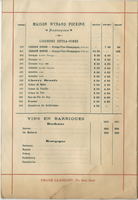Search the Special Collections and Archives Portal
Search Results

Epilogue: Nevada Southern University Yearbook, 1960
Date
Description
Yearbook main highlights: schools and departments; detailed lists with names and headshots of faculty, administration and students; variety of photos from activities, festivals, campus life, and buildings; campus organizations such as sororities, fraternities and councils; beauty contest winners; college sports and featured athletes; and printed advertisements of local businesses; Institution name: Nevada Southern University, Las Vegas, NV
Mixed Content

Marie Antoinette Antonio oral history interview: transcript
Date
Archival Collection
Description
Oral history interview with Marie Antoinette Antonio conducted by Cecilia Winchell and Stefani Evans on December 4, 2021 for Reflections: The Las Vegas Asian American and Pacific Islander Oral History Project. Marie reflects on her upbringing in Cagayan de Oro, Philippines and her love of music that came from her mother. Marie talks about studying music in college and traveling with her husband to Guam to become a music teacher at a Catholic school before immigrating to San Jose, California. She shares the culture shock they faced adapting to life in the United States and the higher cost of living in California, which caused the couple to move to Las Vegas. Marie discusses her life in Las Vegas, traditions and cultural celebrations she partakes in, and the American Dream.
Text

Junior Fonotisatele oral history interview: transcript
Date
Archival Collection
Description
Oral history interview with Junior Fonotisatele conducted by Cecilia Winchell and Stefani Evans on November 10, 2021 for Reflections: The Las Vegas Asian American and Pacific Islander Oral History Project. Junior discusses his Samoan background and the importance of strong family values. He talks about his early years in Utah and California before moving to Las Vegas where he attended and graduated from the University of Nevada, Las Vegas. Junior shares his employment history as a bodyguard for Floyd Mayweather, an entrepreneur of a clothing brand, and an investor into a range of ventures including security, solar energy, and mental health. He concludes with a discussion of Samoan cultural celebrations, his religion, and the significance of his tattoos.
Text
Steve Sisolak (Nevada Governor) oral history interview conducted by Magdalena Martinez: transcript
Date
Archival Collection
Description
From the Lincy Institute "Perspectives from the COVID-19 Pandemic" Oral History Project (MS-01178) -- Elected official interviews file.
Text
Stewart, Helen Jane Wiser, 1854-1926
Helen Jane Wiser Stewart was born in 1854 in Springfield, Illinois. When she was nine years old, the family moved to Nevada, and then to Sacramento, California in 1863. Helen was educated in Sacramento and in 1873 she married Archibald Stewart in Stockton, California.
Person
Scott Henry Photographs of the Las Vegas, Nevada Latinx Community
Identifier
Abstract
The Scott Henry Photographs of the Las Vegas, Latinx Community (approximately 1983-2000) consist of 42 photographic prints depicting members of the Latinx community in Las Vegas, Nevada. Thirty-eight of the prints were used as part of a collaborative project between Scott Henry, photographer and editor for the Las Vegas Review-Journal, and Thomas Rodriguez, a prominent member of the Latinx community in Las Vegas, for an exhibit of the Las Vegas Latinx community. Henry and Rodriguez together planned who to photograph for the exhibit. The photographs demonstrate the impact that the Latinx community has on the region's political, economic, and social growth and development. A number of the photographs show early members of the League of United Latin American Citizens (LULAC), including John Mendoza, Delia Martinez, Tom Rodriguez, Bob Agonia, Corrine Gutierrez, Nick Flores, Grace Salazar, and Gus Ramos.
Archival Collection
Kenneth Giles Professional Papers
Identifier
Abstract
The Kenneth Giles Professional Papers (1964-2001) contain documents and visual material related to Giles's time as an Environmental Radiation Monitor for the Environmental Protection Agency (EPA) at the Nevada Test Site (NTS). Photographic slides, film, and digital images depict the general flora and fauna throughout the area surrounding the NTS. Visual materials also document specific mule deer and steer surveillance and testing at the EPA Farm located within the NTS. The collection also contains environmental reports written or collected by Giles, government documents, pamphlets, and newspaper clippings related to environmental monitoring and Giles's work at NTS. A small portion of the collection documents his brief role providing monitoring support at Three Mile Island in Pennsylvania in 1979. Note: Some images may be of a graphic or disturbing nature and may not be suitable for some users. Photographs may contain scenes of animal testing or other objectionable imagery.
Archival Collection
Christie Young Papers
Identifier
Abstract
The Christie Young Papers are comprised of Young's personal papers, journals, and photographs between 1982 and 2011. The journals document Young's arrival to Las Vegas, Nevada and her involvement in several nascent Las Vegas lesbian, gay, bisexual, transgender, and queer (LGBTQ) organizations from 1982 to 1985, such as UNLV's Lesbian and Gay Academic Union (LGAU). The collection includes materials related to her life in San Diego, California from 1985 to 1995 and typed transcripts of all journal entries that relate to the Las Vegas LGBTQ community. The collection also includes photographic slides and prints documenting Young's involvement with LGAU and events in the Las Vegas LGBTQ community.
Archival Collection
Eileen Brookman Papers
Identifier
Abstract
The Eileen Brookman Papers date from 1934 to 2002 and document Brookman's personal life and political career. Brookman was active in the Las Vegas Jewish community. Personal papers include programs from B'nai B'rith, scrapbook materials, correspondence, and photographs. The collection includes documentation from the White House Conference on Aging. She served several terms in the Nevada State Assembly from 1967 to 1977 and again from 1987 to 1989. Political materials include legislative information, bumper stickers, election returns, and newspaper clippings.
Archival Collection

